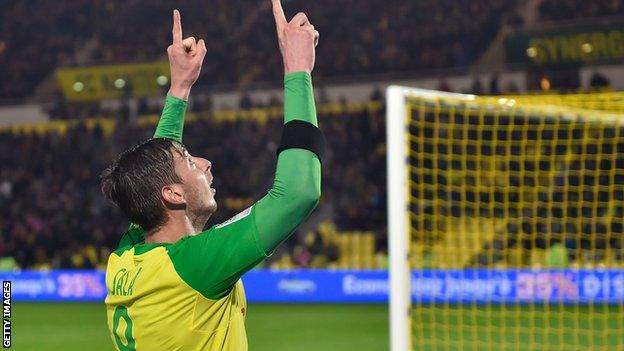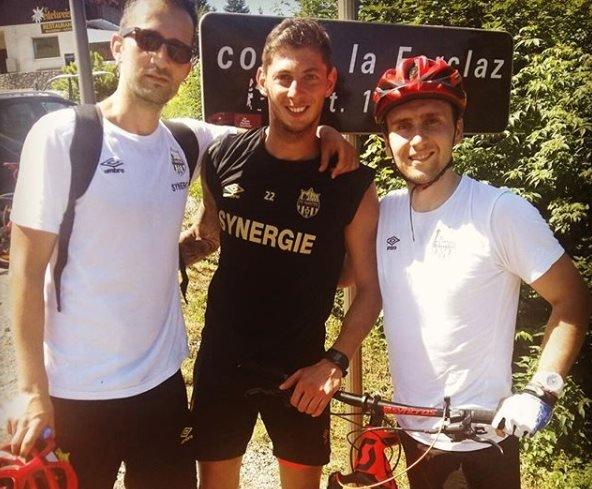Emiliano Sala: Profile of 'a South American warrior' & the 'local Carlos Tevez'
- Published

Emiliano Sala scored 12 goals in Ligue 1 this season
Just three days after he signed for Premier League club Cardiff City, Emiliano Sala was on a light aircraft that went missing over the English Channel on 21 January. Dorset Police on Thursday night confirmed the 28-year-old's body had been recovered from the wreckage, which was found on Sunday morning.

This is an updated version of a story first published on 22 January.
At 28, Emiliano Sala, whose death in a light aircraft crash has been announced, had just reached football maturity, and his move to Cardiff was shaping up to be a thrilling adventure.
The transfer marked belated recognition for a player who might have been imperfect technically but who was physical, courageous - and endearing.
On the pitch, he was confrontational; off it, he led a quiet life.
He loved detective novels and would never go to an away game without taking a book. He played guitar too but took that up quite late, and usually preferred to leave it at home.
A common morning sight in Nantes was Sala, seated at a table outside a cafe with his labrador Naja curled up at his feet.
Destiny is cruel.
Fans of Nantes football club spent the whole of January hoping - rumour had it that Sala didn't really want to leave for Cardiff. His coach, Vahid Halilhodzic, had rekindled his career last October following a long period of struggle under former manager Miguel Cardoso and refused to discuss the possibility of his striker leaving.
Halilhodzic - himself a former centre-forward at Nantes - had decided his mission was to relaunch the Argentine player, whose role model since childhood had been the legendary striker Gabriel Batistuta.
"He's a sensitive young man; he needs to feel confident, so the priority was to help him believe in himself. Only after that could we talk, striker-to-striker," said Halilhodzic.
Sala confirmed: "The club was ready to sell me to Galatasaray, but I held on tight. I have no regrets, because Vahid and I talk a lot, and I'm steadily improving."

Emiliano Sala's Instagram page includes pictures of him cycling with friends
Between July and September, during the Cardoso era at Nantes, Sala scored four times; between October and December, he scored eight times.
'If he were an English player, he would be Jamie Vardy'
Sala was first and foremost an instinctive striker.
If he were an English player, he would have been Jamie Vardy: a player who liked wide spaces and being part of a team with a strong counter-attacking style; a lively, light player but one who was also resilient and reliable - a real South American warrior.
During his time with French club Niort he was often referred to as "the local Carlos Tevez".
Sala was also a skilled 'fox in the box', thanks particularly to his exceptional finishing ability with his head. He had perfect timing, and he was clinical on set-pieces with his great headers. There was no doubt his technique still lacked something, but the Premier League looked like his turf to conquer.
He was initially unsure about joining a club struggling in their own league, but Kita, the president of Nantes, didn't want to miss out on the 17m euros transfer fee.
The player Cardiff wanted was the Sala that Halilhodzic had so successfully polished and relaunched.
In Argentina, Sala trained in San Francisco, Cordoba, at an academy allied to Bordeaux, moving to France to join Bordeaux when he was 20.
Everyone who knew him there agrees - Emiliano was a good guy and a good team-mate.
Felipe Saad, who played with Sala at Caen, told L'Equipe: "He was a lovable, generous fellow. He always believed that football was a team sport. I am so shaken.
"His move to Cardiff was going to bring him the recognition he deserved, albeit belatedly. He so deserved his talent to be recognised."
It is true that Sala's progress was rather slow: people still referred to him as a "promising talent" when he was 23 and at Bordeaux.
His team-mates even poked fun at him for his unpolished style on the field - so much so that, after a season spent in the Bordeaux reserves in 2011-12, Sala was loaned to Orleans, then a Niveau 3 team. He went on to score 19 goals in 37 matches.
Next came another loan, this time to Niort, in D2. Initially, Sala's then-coach Pascal Gastieu had no real interest in him.
"I considered his technique to only be adequate, though everything else was there," said Gastieu. "He was a generous guy and when he was on the field he never gave up.
"He knew he had room for improvement, especially on a technical level. He'll reach full maturity later than the average player, you'll see."
At the time, Sala agreed: "My headers aren't good enough, even though I'm tall. It's something I'll have to work on."
Sala's next loan move took him to Caen. It wasn't always easy for him, a joint Italian-Argentine national, to be constantly on the move. But he eventually found his feet at Nantes, where he won an initial five-year contract.
It didn't take Sala long to establish himself and soon Wolves, then in the Championship, got in touch with Nantes about him. President Kita, who had signed Sala a year earlier for 1m euros, rejected the 4m euros offer.
Sala had been tempted - "this might be the second division, but that's the English league" - but he knew that, even at 26, he wasn't yet mature enough to go up against the solid defence of English teams.
"I haven't left my mark on Nantes yet. If I was to leave, I would want it to be after I've made it, and I'd want to leave a good memory of me."
Sala could be spotted outside a cafe in Nantes, having breakfast with Naja, as recently as a few weeks ago.
Afterwards, he went to say goodbye to his Nantes team-mates. Then he boarded a plane to Cardiff.